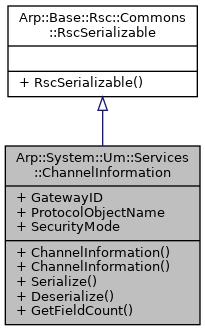Describes an external channel at which the authentication of a user was requested. More...
#include <ChannelInformation.hpp>

Public Member Functions | |
| ChannelInformation (void) | |
| Constructs an ChannelInformation instance. | |
| ChannelInformation (uint32 gatewayID, const RscString< 512 > &protocolObjectName, MessageSecurityMode securityMode) | |
| Constructs an ChannelInformation instance. | |
| void | Serialize (RscWriter &writer) const |
| Serializes the datatype. All fields of the datatype have to be serialized in use of RscWriter. More... | |
| void | Deserialize (RscReader &reader) |
| Deserializes the datatype. All fields of the datatype have to be deserialized in use of RscReader. More... | |
 Public Member Functions inherited from Arp::Base::Rsc::Commons::RscSerializable Public Member Functions inherited from Arp::Base::Rsc::Commons::RscSerializable | |
| RscSerializable (void)=default | |
| The default constructor. | |
Static Public Member Functions | |
| static size_t | GetFieldCount (void) |
| Returns the count of fields More... | |
Public Attributes | |
| uint32 | GatewayID = 0 |
| An identifier of the gateway at which the user authentication was processed first. More... | |
| RscString< 512 > | ProtocolObjectName |
| A human readable name which describes the protocol which the gateway talks with a remote instance which authenticates a user. More... | |
| MessageSecurityMode | SecurityMode = static_cast<MessageSecurityMode>(0) |
| Information about the authenticity and secrecy of messages received and sent through the external channel. | |
Detailed Description
Describes an external channel at which the authentication of a user was requested.
External is meant relative to the PLCnext technology.
An external channel can be an external TCP-based Remoting connection from a Remoting client to the RSC-gateway. In that case the RSC-gateway processes the user authentication request of the user and then asks the UserManager internally via IPC-based or in-process Remoting call to actually perform the authentication and create the session. This second call is then an internal channel. The channel information contained in an instance of this object is then used to augment session context information within the UserManager.
Another example of an external channel can be an external OPC UA connection from an OPC UA client to the embedded OPC UA server built-in into PLCnext technology. In that case the OPC UA server processes the user authentication request and then asks the UserManager internally via IPC-Based or in-process Remoting call to actually perform the authentication and create the session.
Member Function Documentation
◆ Deserialize()
| void Arp::System::Um::Services::ChannelInformation::Deserialize | ( | RscReader & | reader | ) |
Deserializes the datatype. All fields of the datatype have to be deserialized in use of RscReader.
- Parameters
-
reader Reference to RscReader.
◆ GetFieldCount()
|
static |
Returns the count of fields
- Returns
- Count of fields.
The field count is used for serialization via Rsc
◆ Serialize()
| void Arp::System::Um::Services::ChannelInformation::Serialize | ( | RscWriter & | writer | ) | const |
Serializes the datatype. All fields of the datatype have to be serialized in use of RscWriter.
- Parameters
-
writer Reference to RscWriter
Member Data Documentation
◆ GatewayID
| uint32 Arp::System::Um::Services::ChannelInformation::GatewayID = 0 |
An identifier of the gateway at which the user authentication was processed first.
The value of
has meaning only internally to the PLCnext technology device because it depends on its current configuration.
◆ ProtocolObjectName
| RscString<512> Arp::System::Um::Services::ChannelInformation::ProtocolObjectName |
A human readable name which describes the protocol which the gateway talks with a remote instance which authenticates a user.
Examples:
| value | description |
|---|---|
arp.static.device/rsc.tcp:41100
| The RSC-gateway listening at TCP port 41100. |
arp.static.device/opc.tcp:4840
| The OPC UA server listening at TCP port 4840. |
The documentation for this class was generated from the following files:
- Arp/System/Um/Services/ChannelInformation.hpp
- Arp/System/Um/Services/ChannelInformation.cpp